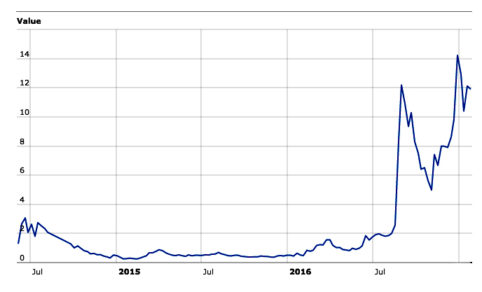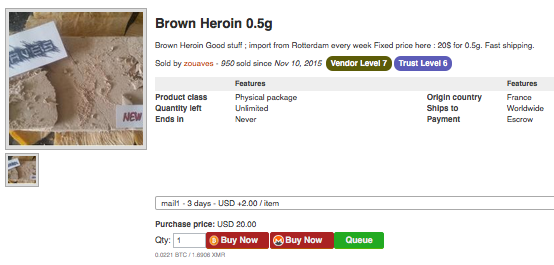FOR THE CRYPTOCURRENCY community, 2016 was a very good year. Bitcoin doubled in price. The far-out Bitcoin alternative Ethereum shot up by a factor of 10. But another, once-obscure cryptocurrency called Monero outpaced all of them, multiplying its value around 27-fold. That’s a windfall not just for cryptocurrency speculators, but for financial privacy advocates everywhere—including a few suddenly wealthy dark web drug dealers.
Over the last year, the value of the hyper-anonymous cryptocurrency Monero grew 2,760 percent, making it almost certainly the best-performing cryptocurrency of 2016. Today each Monero is worth around $12, compared with just 50 cents at the beginning of last year, and the collective value of all Monero has grown to close to $165 million. The source of that explosive growth seems to be Monero’s unique privacy properties that go well beyond the decentralization that makes Bitcoin so resistant to control by governments and banks. It’s instead designed to be far more private: fully anonymous, and virtually untraceable.
Those features have made Monero a budding favorite within at least one community that has a pressing need for secrecy: the dark web black market. In August, the darknet market site Alphabay began offering its thousands of vendors the option to accept Monero as an alternative to Bitcoin. A quick browse through the market today shows dealers of everything from stolen credit cards to heroin to handguns accepting the stealthier cryptocoin. That increase in illicit users also illustrates Monero’s privacy potential, says Riccardo Spagni, one of Monero’s core developers.
“That uptick among people who really need to be private is interesting,” says Spagni. “If it’s good enough for a drug dealer, it’s good enough for everyone else.”

Monero’s price in dollars since it’s creation.
Monero’s price in dollars since its creation.
Not Another Bitcoin
It’s tempting to think of cryptocurrencies in terms of Bitcoin—in part because many cryptocurrencies are Bitcoin derivations. Monero’s fully its own entity, though. First outlined in an October 2013 whitepaper by the pseudonymous figure Nicolas van Saberhagen and called Cryptonote, another pseudonymous individual known only as “thankful_for_today” later coded those ideas into a currency called Bitmonero. When open-source coders on the Bitcointalk forum disagreed with thankful_for_today’s directions for the currency, they forked it in 2014 to create Monero, whose name means simply “coin” in Esperanto.
Its structure solves several key privacy vulnerabilities that dog Bitcoin, which despite its reputation for secret transactions has long been stuck in a strange privacy paradox. Unlike commercial services like PayPal, Bitcoin allows anyone to spend money online without providing identifying details. But if someone’s Bitcoin address is linked with their real identity, any transaction from that address is entirely visible on the public blockchain, the accounting ledger that prevents fraud and forgery in the Bitcoin economy. Hiding those transactions requires taking extra steps, like routing bitcoins through “tumblers” that mix up coins with those of strangers—and occasionally steal them—or using techniques like “coinjoin,” built into some bitcoin wallet programs, that mix payments to make them harder to trace. “If I pay my rent in Bitcoin, it wouldn’t be that hard for the landlord to figure out how much money I earned if I don’t take extra precautions,” says encryption and cryptocurrency consultant Peter Todd. “Then they can decide whose rent to increase. You’re giving away information you don’t want to make public.”
Monero not only bakes anonymity features into the cryptocurrency itself, but implements a few features that Bitcoin still can’t offer. It uses a technique called “stealth addresses” to generate addresses for receiving Monero that are essentially encrypted; the recipient can retrieve the funds, but no one can link that stealth address to the owner. It employs a technique called “ring signatures,” which means every Monero spent is grouped with as many as a hundred other transactions, so that the spender’s address is mixed in with a group of strangers, and every subsequent movement of that money makes it exponentially more difficult to trace back to the source. And it uses something called “ring confidential transactions,” which hides the amount of every transaction.
“Even with big data analysis, the ability to farm anything out of the metadata is cryptographically negligible,” says Spagni. In future implementations, he notes that Monero will add the anonymity software I2P to mask not only users’ transactions on the Monero blockchain, but also the internet traffic underlying those transactions.
All of that makes Monero a significant upgrade for a cryptocurrency user’s financial privacy. Todd, for instance, says he keeps a small Monero account, but transfers bitcoins into it when he wants to spend his cryptocurrency more stealthily, using the exchange tool Shapeshift to transform the coins from Monero back to bitcoin before they reach the recipient’s account. “I basically use Monero to pay people with bitcoin anonymously,” Todd says.
The Monero Market
That strict secrecy also helps explain Monero’s darknet popularity. After Alphabay and a smaller dark web black market, known as Oasis, integrated the cryptocurrency last summer, its value immediately increased around six-fold. Alphabay told Bitcoin Magazine last month that the currency now accounts for about two percent of its sales. That’s a small fraction, but still likely amounts to millions of dollars in annual revenue, given Alphabay’s dominant position in the dark web drug market and estimates of that market’s total size and growth.

A screenshot from online black market Alphabay showing heroin offered in exchange for either Bitcoin or Monero
Spagni says he expects Monero will no doubt be used in other potentially unsavory ways, too, like ransomware, and as currency for the gambling and porn industries. But he argues it will also be used for more innocent forms of financial privacy, like keeping your net worth secret while making routine purchases, or buying contraband like outlawed books in oppressive regimes. He also argues the uses of Monero are out of his and his fellow developers’ control. “I’m in no position to judge what people should or shouldn’t do, and no one else should be either from a code perspective,” he says.
Monero isn’t the first cryptocurrency designed to offer a financial privacy panacea: Dash, formerly known as Darkcoin, integrates the “coinjoin” technique that allows bitcoin users to mix their transactions with a few other spenders in what Todd calls a weaker form of anonymity than Monero offers. More recently, Zcash debuted with the strongest anonymity promises yet—it uses cryptographic tricks designed to make tracing a transaction not only unlikely, but mathematically impossible. Zcash has yet to be integrated into dark web markets, though, and still requires wielding the command line to use.
Despite the currency’s sudden spike in price, Spagni denies that he or any of the other core Monero coders are sitting on a massive pile of wealth. “We’re just working on this to see where it goes,” he says. But the promise and peril of Monero, of course, is that no one can check that claim. The stashes of the Monero developers, like those of its growing base of users, will stay secret by design.
Fonte: https://www.wired.com

